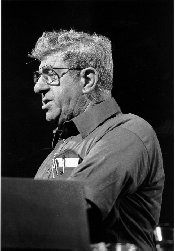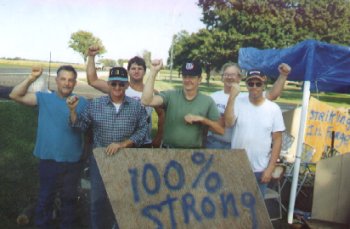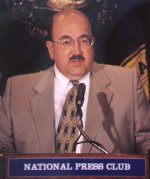
IAM Mourns Union Icon Phil Zannella
Phillip M. Zannella, Sr. one of the Machinists UnionÕs most veteran and respected labor leaders in Ohio, died September 15, in his home in Highland Heights.
"Phil was the most dedicated
trade unionist I have ever known," said IAM President Tom Buffenbarger.
"He was an authentic blue-collar leader, full of  compassion
and determination to advance the cause of American workers. He was tireless
in his efforts. He was my friend and teacher, and I will miss him."
compassion
and determination to advance the cause of American workers. He was tireless
in his efforts. He was my friend and teacher, and I will miss him."
Zannella joined the Machinists in 1946 as an auto mechanic at a Cleveland-area Ford dealership. He held offices in Local 1363, District 54, the Ohio State Council of Machinists and the Ohio AFL-CIO.
Zannella spent his entire
union career in Ohio. "He loved his union," Buffenbarger adds, "but he
also loved his state and his community."
Zannella is survived by
Ruth, his wife of 55 years; a daughter Gloria; a son, Phillip, Jr., a District
54 business representative in Cleveland and chairman of the IAM's law committee;
eight grandchildren and several brothers.
"He was an authentic blue-collar
leader, full of compassion and determination to advance the cause of American
workers," said Buffenbarger.

Members Stay Tough at Illinois Forge
Local 1988 members at Illinois
Forge are standing tough. During the rough times in the 1980ís, they sacrificed
to keep their company going. After profits took off in the 1990ís, management
turned its back on employees. During contract negotiations, they proposed
reducing vacation, providing fewer health benefits but higher premiums,
canceling retiree life insurance and a 2 percent wage increase for the
entire three-year agreement.
Such unfair demands led to
100% member support for a strike. Now, more than 15 months later Local
1988 members are still 100% strong. ďWeíre going to get this strike settled.
These members are tremendous. They deserve it,Ē said Midwest GVP Alex Bay.
Buffenbarger Speaks out for Missile Defense
On July 20, 2001 International
President Tom Buffenbarger addressed the National Press Club to outline
the IAMís support of a National Missile Defense (NMD) program. In the following
excerpt from his address, Buffenbarger says a long-range and bi-partisan
approach to deploying NMD is ďan opportunity to protect the cities of America.Ē:
Missile technology today
is a genie that is out of the bottle. Ö Thirty-five nations around the
world are now known to possess some form of ballistic missile -- and most
of the others, no doubt, know where to buy them. At least ten countries
in the world possess chemical or biological weapons --- and one of the
terrible truths of our times is that weapons of this kind are not all that
hard to make. 
At least eight countries are known to have nuclear weapons. Between three and five others are knocking on the door. And if itís true what we hear about whatís been going on in the former Soviet Union, then who knows what in the way of weapons and fissionable materials may reach ---or have reached already --- the international black market.
Listen --- I mentioned to
you before the name of Timothy Mc Veigh. This was a guy, who with calculation
and great malice, committed a horrible, unspeakable atrocity.
But Mc Veigh was an American
-- a Catholic kid from a blue collar family in Buffalo. Whatever the crazy
place he wound up, the guy started out in life exposed to a set of values
that we all understand, honor and respect.
Out in the world as it is
today, there are a lot of folks who donít start with values like ours.
There are people -- people who run or will run countries and major movements
-- who start out where Mc Veigh wound up. And if they donít have such things
already, they soon may be able get their hands on really terrible weapons
-- and on the missiles to deliver them on American targets.
Which of our cities might
be the target? Would it be Anchorage? Honolulu? Seattle? Portland? San
Francisco? Los Angeles? Do you think that this is far-fetched? Improbable?
Who, you might ask, would be crazy enough to risk his or her own personal
survival?
The surviving crew members of the U.S.S. Cole know the answer. So do the parents of the twenty-odd Israeli teenagers who went out dancing one night not long ago and never came home. What I am saying to you is that we are no longer dealing with predictable threats.
The Soviet Union was a truly
nasty regime -- and a ruthless one to boot. I, for one, rejoiced to see
it go away. But in a strategic sense, the USSR was a known quantity. It
had leaders who were cautious and who were interested in this world, not
the next. They understood what weapons of mass destruction really are.
And in their own sphere, they were in complete control.
For better or for worse,
thatís not the world in which we live today. It is not the world in which
our children and grandchildren will be growing up. Seven. Ten. Fifteen
years from now, they will face graver and more unpredictable threats.
So, to my Democratic friends on Capitol Hill, I would urge them to forego the short-term, tactical, partisan advantage. I know how easy it would be to craft a maze of budgetary and diplomatic obstacles that could stall development of a national missile defense. But can our party really afford to be seen as weak on the defense of Americaís cities? I think not. I hope my partyís leaders will come to agree with me.
And, to those Republicans
whose anti-union credentials are impeccable, I would urge you to go slow.
Speed is not the imperative here. The successful defense of Americaís cities
is. In your haste to win political points, you may jeopardize the entire
missile defense program. And that would be a travesty.